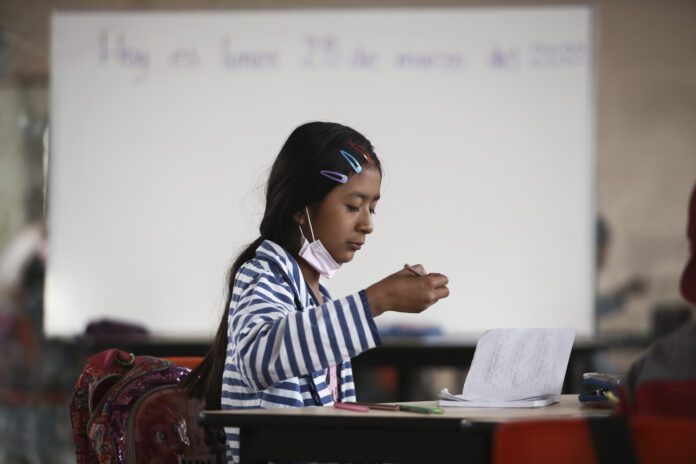CIUDAD JUAREZ, Mexico (AP) — His completed geometry exercise in hand and a smile lighting up his eyes above his face mask, Victor Rodas rushed to the teacher as other students were still drawing.
“I’m winning the race!” the 12-year-old exclaimed. “I’m already done, teacher. I beat everyone.”
Being enrolled in a school program designed for migrant children in Ciudad Juarez, Victor does have a leg up on many others like him who, fleeing poverty and violence, lose months or even years of schooling on their journeys.
Giving them access to education is a daunting and urgent challenge.
Just in this vast desert metropolis next to El Paso, Texas, thousands of migrant families have hunkered in shelters, waiting to cross into the United States. They’re prevented from seeking asylum there by U.S. policies that made some wait in Mexico for their court hearings and banned others under a pandemic-era order set to expire May 23.
Pastor-run shelters have partnered with educators to help — either busing children to an alternative school that teaches everything from math to reading to dealing with emotions, or bringing in specially accredited teachers.
While the curriculum is not religious, faith animates these projects, as it does many other migrant relief efforts at the border. It also informs many of the educators, who recognize schooling as crucial to the youths’ future, including their ability to socialize and eventually find jobs and feel at home wherever they end up.
“They get integrated in the educational system so they can keep gaining confidence,” said Teresa Almada, who runs Casa Kolping, where Victor studies, through a local organization funded three decades ago by lay members of Catholic parishes. “It’s also important … that the families feel they’re not in hostile territory.”
Victor’s oldest sister, Katherine Rodas, 22, fled death threats in Honduras with him and two other siblings she raised after their mother died. While she and her husband are so fearful of gangs that they don’t dare leave their Catholic-run shelter, she leapt at the chance for the children to be bused to Casa Kolping.
“They say the teacher always takes good care of them, plays with them,” Rodas said. “They feel safe there.”
Their shelter, Casa Oscar Romero, is named for a beloved Salvadoran archbishop, known for ministering to the poor, who was assassinated during his country’s civil war and later made a saint by Pope Francis. Many housed at this shelter and elsewhere in Ciudad Juarez fled Central America; growing numbers of Mexican families from areas engulfed in cartel warfare are arriving, too.
For a while after the school program started in October, teachers encouraged parents to join their children in the classrooms to build trust. Among them was Lucia, a single mother of three who fled the Mexican state of Michoacan after a drug cartel “took over the harvest and everything” in their home. She asked to be identified by just her first name for safety.

